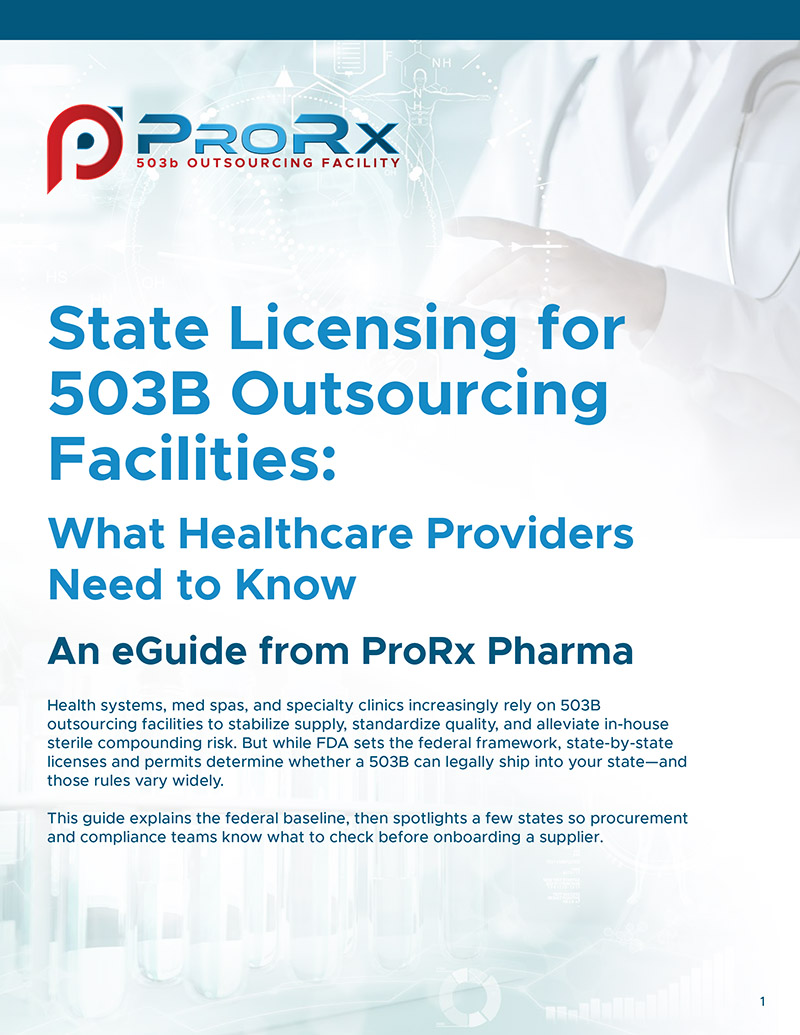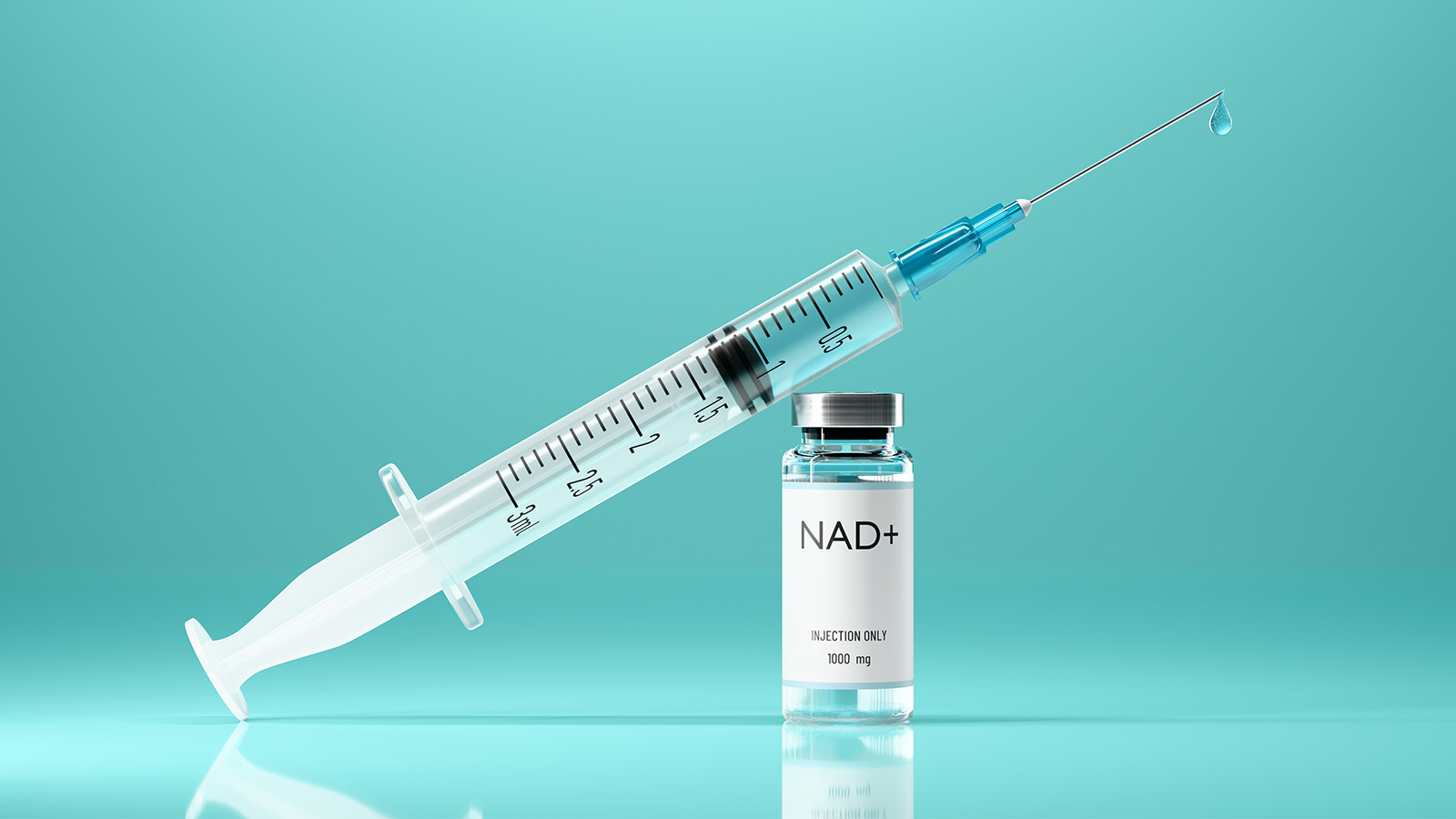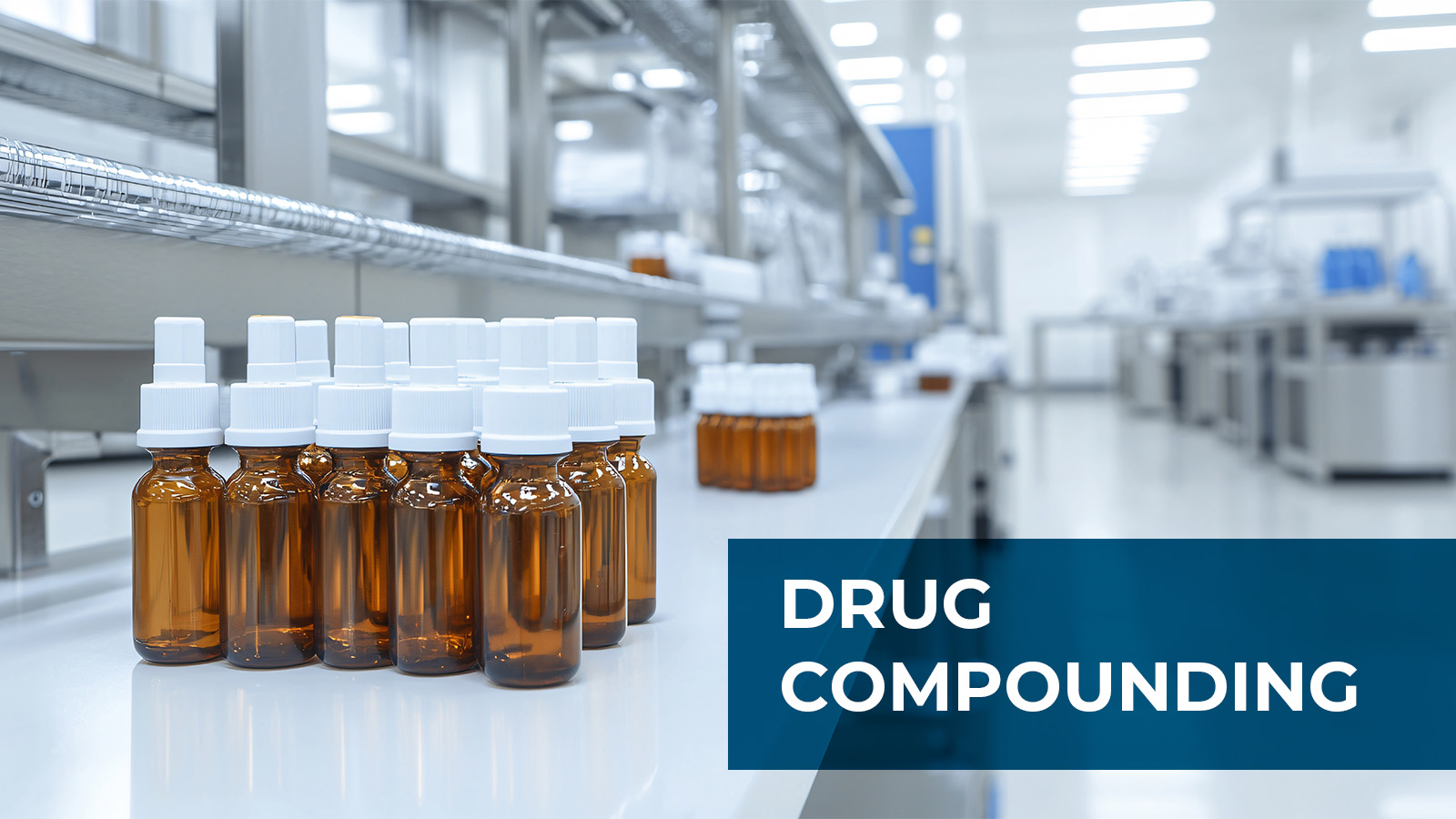eGuide
Health systems, med spas, and specialty clinics increasingly rely on 503B outsourcing facilities to stabilize supply, standardize quality, and alleviate in-house sterile compounding risk. But while FDA sets the federal framework, state-by-state licenses and permits determine whether a 503B can legally ship into your state—and those rules vary widely.
This guide explains the federal baseline, then spotlights a few states so procurement and compliance teams know what to check before onboarding a supplier.
Federal Baseline (What Applies Everywhere)
Under §503B of the Federal Food, Drug, and Cosmetic (FD&C) Act, a compounder can elect to register as an outsourcing facility. Registered 503Bs must:
- Follow current Good Manufacturing Practice (CGMP) under 21 CFR Parts 210/211 (foundational FDA regulations establishing the minimum Current Good Manufacturing Practices (cGMP) for the pharmaceutical industry)
- Undergo FDA risk-based inspections
- Report products to FDA twice yearly and report adverse events
- Operate from one geographic location per registration
The FDA also publishes and updates the official list of registered 503B facilities—a helpful checkpoint when vetting new suppliers.
Bottom line: Federal registration is necessary, but not sufficient. State licensure controls whether products can be shipped into (or within) a state.
Why State Licenses Matter for Healthcare Providers
Even when a 503B is fully FDA-compliant, state rules can still block shipments or create administrative delays. Typical state requirements can include:
- A dedicated outsourcing facility license/registration
- Licensure as a manufacturer and/or wholesaler
- Nonresident permits to ship into the state
- A designated Pharmacist-in-Charge (PIC)
- Documented sterile compounding standard operating procedures
- Proof of recent inspections and compliance history
For procurement teams, that means:
- Verify FDA registration
- Confirm the facility holds the right state permits for your state(s) before the first purchase order
Specific State Licensing Examples
Florida
If a nonresident outsourcing facility ships sterile compounded products into Florida, it must hold a Nonresident Sterile Compounding Permit issued by the Florida Board of Pharmacy. Applications require proof of FDA §503B registration and a recent inspection report, among other documents. Florida’s site also outlines processing timelines and renewal details.
Arizona
Arizona classifies 503B outsourcing facilities under the licensing framework for drug manufacturers. Nonresident entities must include a copy of their home-state permit, a drug or device list, and FDA registration as part of their application. Resident facilities must similarly provide detailed plans, a designated representative’s qualifications, lease/zoning documentation, and related materials.
Texas
In Texas, 503B outsourcing facilities are licensed as a subcategory of prescription drug manufacturers—and possibly wholesalers—depending on operations. Nonresident or out-of-state pharmacies that compound sterile preparations, including high-risk compounding, must apply under the Class E-S license. The process requires designation of a Texas-licensed Pharmacist-in-Charge (PIC), submission of ownership and disciplinary history details, and payment of the current application fee (approximately $507).
Massachusetts
Massachusetts licenses outsourcing facilities—both resident and nonresident—with oversight from the Board of Registration in Pharmacy. Applicants must demonstrate:
- Valid FDA 503B registration
- An FDA inspection within the prior 2 years (or may receive provisional registration pending inspection)
- Controlled substances registration per Chapter 94C if applicable
Registrations expire on December 31 of odd-numbered years and require renewal with proof of continued FDA registration. Additionally, nonresident outsourcing facilities must designate at least one Massachusetts-licensed pharmacist as a Pharmacist-in-Charge; inspections must be conducted by Board-approved inspectors, and plans of correction must be submitted for identified deficiencies.
Practical Checklist for Onboarding a 503B Supplier
- Confirm FDA status
- Check the supplier against the FDA’s “Registered Outsourcing Facilities” list
- Map licenses to your delivery locations
- For every state you will ship to, request copies of current state permits (outsourcing facility, manufacturer, wholesaler, and—if applicable—nonresident pharmacy)
- Request recent inspections as well as Corrective and Preventive Actions (CAPAs)
- Ask for the most recent FDA or state inspection reports (or summaries) and related corrective actions
- Verify Pharmacist-in-Charge and Standard Operating Procedures (SOPs)
- Ensure the 503B maintains a defined quality unit, validated aseptic processes, and SOPs aligned to CGMP/USP
- Calendar renewals
- Put state renewal dates and FDA re-registration on a shared compliance calendar so purchasing isn’t disrupted by lapses
- Document intended use
- If any scenarios involve patient-specific prescriptions, confirm whether additional pharmacy licensure is triggered in your state(s)
The Bottom Line
Navigating state licensing for 503B outsourcing facilities is a critical step for healthcare providers seeking safe, reliable sterile compounded medications. While FDA registration establishes a federal baseline, each state sets additional requirements—such as nonresident permits, pharmacist‑in‑charge designation, and documented sterile compounding SOPs—that must be met before shipments can legally occur.
By understanding these regulations and verifying state-specific licenses, inspection histories, and quality controls, providers can minimize compliance risk, ensure patient safety, and maintain uninterrupted access to high-quality compounded medications.










